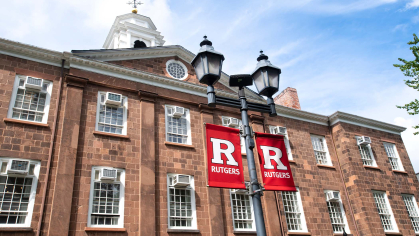Rutgers Board of Governors Approves $5.4 Billion Budget, 6 Percent Tuition and Fees Increase
Costs for energy, salaries and benefits drive increases
The Rutgers Board of Governors today approved a $5.4 billion operating budget for the fiscal year that began July 1. The budget is supported in part by a 6 percent increase in tuition and fees for the 2023-2024 academic year, a nearly 7 percent increase for meal plan costs and a 5 percent increase in housing costs for students who reside in Rutgers facilities.
Tuition for full-time New Jersey arts and sciences undergraduate students will increase by approximately $387 from $6,450 per semester to $6,837. Fees vary by program and by student, but typical fees are estimated to increase by approximately $100 per semester.
The increases reflect rising costs to the university including general inflation, increases in salaries and wages, sharp increases in utilities and commodities, and unprecedented increases in the cost of employee benefits, including health insurance premiums and pension contributions.
"We are committed to providing access to an excellent academic experience and this budget advances that pledge while meeting our financial responsibilities during a very challenging time,” said William E. Best, chair of the Rutgers Board of Governors. “We remain equally committed to strengthening financial aid programs that reduce net costs for a majority of our students.”
Rutgers tuition provides funding for the university’s primary missions of student instruction, research and public service. Tuition also funds financial aid programs for students in need of assistance.
A majority – 77 percent – of the $5.4 billion budget is spent on the university’s core mission: 33 percent on academic instruction and support; 32 percent on student scholarships, financial aid and services, public service, extension and patient care; and 12 percent on research activities. The budget projects spending $159 million, 3 percent, on athletics.
“This budget ensures that Rutgers will continue to provide our students with exceptional academic, research and public service opportunities as they pursue their education and engage in civic life,” said President Jonathan Holloway.
The costs of meeting the university’s three-part mission of instruction, research and public service have dramatically increased in recent years. Energy costs have affected the university in the same way that they have affected family budgets and have increased by approximately 20 percent over the past few years.
Health insurance and pension costs for the university’s 20,000 benefit-eligible employees saw dramatic and unprecedented one-year increases this year. In fact, state health benefit costs increased by more than 22 percent in November 2022. Compounding the financial difficulty, the increase was imposed retroactively, and presented the university with an unanticipated $48 million cost.
The university’s new labor contract with the faculty union, which was agreed to in May 2023 following the first-ever strike by the university faculty, applies retroactively to July 1, 2022. It increases labor costs by nearly 8 percent in the first two years and by a similar amount in the last two years of the four-year agreement.
Four of five Rutgers students receive some form of student financial aid from federal, state, private or institutional financial aid programs, including need-based and merit-based grants, scholarships and loans.


